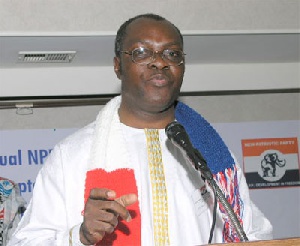- Home - News
- TWI News | TV
- Polls
- Year In Review
- News Archive
- Crime & Punishment
- Politics
- Regional
- Editorial
- Health
- Ghanaians Abroad
- Tabloid
- Africa
- Religion
- Election 2020
- Coronavirus
- News Videos | TV
- Photo Archives
- News Headlines
- Press Release
General News of Monday, 11 August 2014
Source: starrfmonline.com
'IMF bailout hurts most because Ghana has oil'
A former Ghanaian presidential aspirant says even though many past governments of his country, in the past, ran to the International Monetary Fund for assistance, the decision by the current government to do same hurts more because the West African country now produces oil.
In a statement issued from Irmo, SC in the US on Monday August 11, 2014, Dr Arthur Kennedy said it was bad that Ghana, after exiting all IMF programmes and now having oil at her disposal, had done a volte-face.
“Unfortunately, we have been here before. The IMF was around just before the Busia government was toppled by the ‘Yentua Acheampong government’. It was around just before Rawlings came again on the strength of ‘corruption and economic mismanagement’. It assisted the [Provisional National Defence Council] PNDC regime and hailed Ghana as an ‘economic miracle’. It assisted NDC-1 and the Kufuor administrations".
“Indeed, with the latter, we went on to issue the first Eurobond by an African country after South Africa. With each of these bail-outs and the hailing of “successes and miracles," reasonable people had assumed that we had turned the economic corner for good—only to find ourselves in the same soup again. This particular one hurts especially because we have oil," Dr Kennedy wrote.
“If we were doing so well just before we struck the oil, why are we floundering once again—despite having oil?” the former presidential aspirant wondered.
The young oil producer recently wrote to the Bretton Wood Institution for assistance to fix her ailing economy.
According to the ECONOMIST, “Recently, Ghana has been living beyond its means. Public debt is rising rapidly and now tops 50% of GDP in official figures. Fitch, a rating agency puts it at even higher: 62%, taking into account a revaluation of its foreign-denominated debt. The main cause is a yawning fiscal deficit which stood at 10.1% in 2013.”
It said “in 2012, civil servants’ wages consumed 70% of government revenue” and the cedi has dropped nearly 40% against the dollar this year alone.”
According to Dr Kennedy:
With these repeated cycles of bailing out by the IMF, we must ask ourselves some hard questions.
• First, why do we keep needing help from the IMF?
• Second, is this present request for help meant to get more loans or to get policy advice—otherwise known as “apo” or knowledge?
• If public sector wages are this high, was “Single-spine” a mistake?
• Do our governments find it hard to accept advice from the opposition? Are we going to the IMF to listen to the same advice that has been offered by Bawumia, Akoto-Osei and others? If that is the case, why is the opposition applauding the request to the IMF instead of challenging the government to do what it must do?
• If the request to the IMF is for financial help, then what has happened to all the money that has been borrowed since the NDC returned to power in 2009? Sika no wo hen???
• Should we have been more welcoming of Archbishop Duncan Williams’ offer of prayers?
While all these are important questions, the biggest question is whether we are indeed here because of mismanagement and/or corruption.
While there are global currents that are difficult to resist, we must carefully assess the role of the above in our predicament.
Might we be doing better if the NPP had won? Would the NPP also be asking for IMF bail-out? Would the economy be doing better?
Finally, even while we engage the IMF, we must begin engaging with one another on the fundamental causes of our under-development—bad leadership, corruption, an over-bloated civil service, an out-sized “do-nothing” Parliament and an overwhelming focus on politics instead of policy.
Without these changes, a few years from now, another government of Ghana, regardless of the party in power, would be trotting to the IMF, cap in hand, begging for another bail-out even while our abundant human and material resources go to waste.
Entertainment










